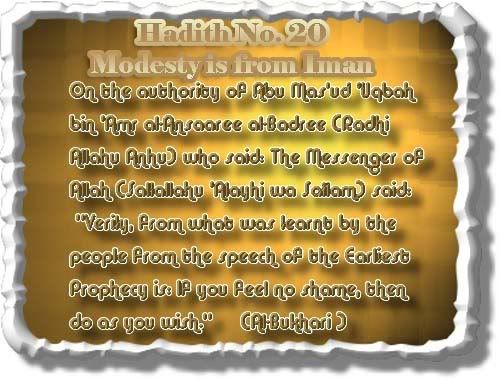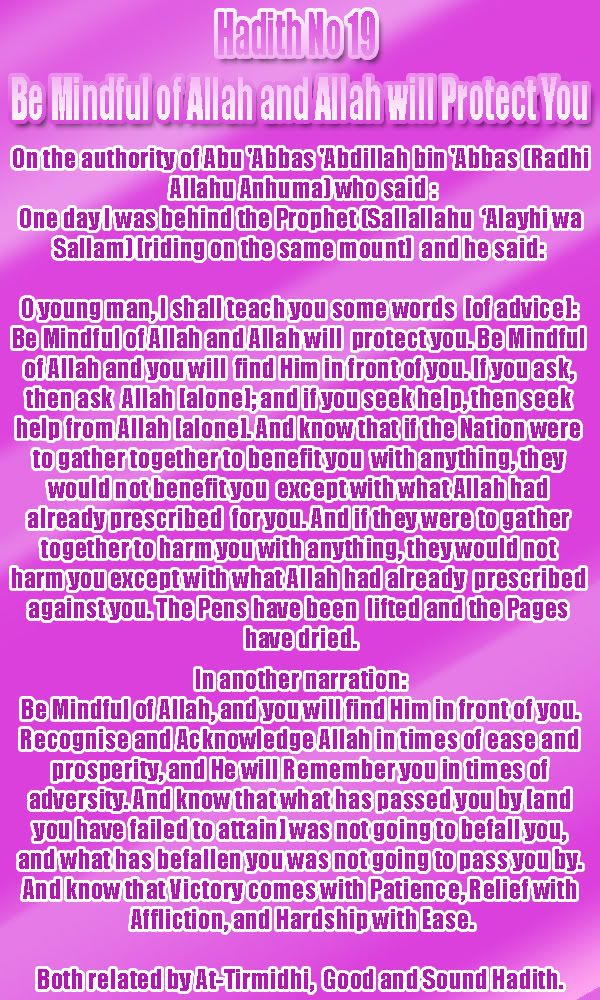
http://fortyhadith.iiu.edu.my/hadith21.htm
Background
The literal meaning of "Istiqamah": to go straight into the right direction, acting rightly, allowing no deviation. It is derived from the stem "Qiyyam", which implies the continuity of doing something, following up with it and making sure that it is done in the right way and there is neither deviation nor swerving.
The term has been used by the Qur'an in many verses. Allah the Almighty says: "Therefore, stand firm (on the straight path) as you are commanded and those who turn in repentance with you. And do not transgress, for He (Allah) sees well all that you do." [Surah Hud (11): ayat 112]
Ibnu Abbas said that this verse was the hardest and most difficult verse of the Qur'an on the Prophet, sallallahu 'alayhi wasallam.
Indeed it is a difficult task to achieve Istiqamah, hence, the Prophet, sallallahu 'alayhi wasallam, said; "Be straight on the path or be close to it."
In another verse, Allah the Almighty says: "So unto this (religion) invite (the people). Stand steadfast as you are commanded and do not follow their desires....." [Surah al-Shura' (42): ayat 15]
Based on these two verses, it can be inferred that Istiqamah is to stand firm and steadfast to what we have been commanded by Allah, i.e. to fulfill obligations and to avoid prohibitions. Also, we should not allow ourselves to follow or be mislead by desires (whether it is our desires or the desires of others) as it will cause deviation and lead us astray.
Lessons
According to Ibn al-Qayyim, there are five conditions to achieve Istiqamah in performing required deeds:
1. The act should be done for the sake of Allah alone (ikhlas).
2. It should be done on the basis of knowledge ('ilm).
3. Performing ibadah should be in the same manner that they have been commanded.
4. To do it in the best way possible.
5. Restricting oneself to what is lawful while performing those deeds.
According to other scholars of suluk, i.e. behavior, there are certain steps to be followed in order to achieve Istiqamah :
1. Always being aware of the final destination, i.e. the Day of Judgment (Akhirah). And to use this awareness in a positive way as a motive to do good deeds. One way to do it is through remembering that a person's journey towards Akhirah starts the minute he/she passes away and leaves this world. One of the Salafs said: "If you live until the morning do not wait for the evening and if you live until the evening do not wait for the morning."
2. Commitment (Musharatah). One has to make a commitment that he/she will be steadfast and will do things in the right way and in the best way possible, and to adhere to conjunctions of Islam. Unfortunately many Muslims are being lenient in making such a commitment.
3. To make continuous efforts (Mujahadah) to bring that commitment to reality. Some Muslims dare to make the commitment, but dare not to make the effort to make the commitment a reality.
4. Continuous checking and reviewing of one's deeds (Muraqabah). Being honest with oneself so as not to give false excuses for failing to fulfill a commitment.
5. Self accountability (Muhasabah). This should be done twice: Firstly, before we start doing something, ensuring that it pleases Allah, that we do it for His sake only, realizing the right way it should be done. Secondly, after the action has been done, to check whether we have achieved what we aimed for, and to check for defects and shortcomings, and that we still could have done it better by not being satisfied with our action.
6. Blaming oneself for not doing it perfectly after it has been done. Self blaming here is a positive one by using it as a motive, and by aiming for improvement and having the intention of doing things better next time. This leads to making another commitment and continual commitments to improve our performance.
7. Striving for improvement (Tahsin). We have to make improvements in all that we do (daily activities, work, actions, good deeds, ibadah, etc.) as one of our objectives.
8. To be humble towards Allah, realizing that no one is perfect except Him, seeking His forgiveness, guidance and support.
It should be emphasized that these steps/conditions apply to worldly matters as well as ibadah and good religious deeds.
Factors that lead to the weakening of Istiqamah include:
1. Committing sins (ma'siah), insisting on repeating them again and again, without istighfar (seeking Allah's forgiveness) and without practicing repentance.
2. Shirk (associating anything with Allah) whether in intentions, by showing off our good deeds to others, seeking others' appraisal, avoiding being blamed by others, being afraid of someone, or to seek rewards from others than Allah. This part of shirk is also called riyya' or showing off. All these lead to deviation in Istiqamah, and when these stimuli are not there, the person's work is not perfect any more and it is not done in the best way possible.
3. Nifaq (hypocrisy). There are two forms of nifaq: in belief and in action. The Muslim who surrenders totally to the will of Allah and accept Islam based on his/her choice is free from the first form of hypocrisy. However any Muslim is subject to and should avoid the second form of nifaq which the Prophet, sallallahu 'alayhi wasallam, warned us about: Not keeping promises and breaking them continuously without good reasons or excuses, not fulfilling commitments we make with others, being aggressive and unjust to others in quarrels, and disputes, failing to shoulder responsibilities/burdens we are entrusted with, etc. All these bad qualities should be avoided since they lead to the weakening of our Istiqamah.
4. Bida'ah (innovations in ibadah), whether genuine bida'ah (performing ibadah which has not been ascribed by Shariah, i.e. revelation), or relative bida'ah (failing to observe the requirements of doing ibadah - the five criteria discussed in Hadith 5), will lead to decreasing the quality of good action or ibadah.
There are other factors that also contribute to the weakening of Istiqamah, such as: recklessness, reluctance, heedlessness, being overwhelmed by a deceiving enjoyment, and being mislead by self interests and desires.
Applying the above mentioned steps and requirements pinpointed by scholars will help in overcoming all these obstacles and barriers.
Conclusion
Istiqamah is an important Islamic concept. Its significance can be seen where every Muslim is required to recite Surah al-Fatihah at least seventeen times each day seeking continual guidance to the straight path from Allah.


